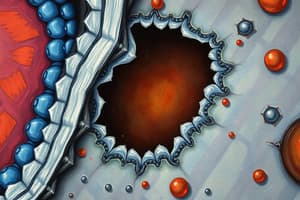Podcast
Questions and Answers
What is the process that breaks down food?
What is the process that breaks down food?
- Respiration
- Digestion (correct)
- Circulation
- Photosynthesis
What are the two types of digestion?
What are the two types of digestion?
intracellular and extracellular
What is intracellular digestion?
What is intracellular digestion?
Within the cell, enzymes break down food into small molecules.
What is extracellular digestion?
What is extracellular digestion?
What are the two types of animal digestive systems?
What are the two types of animal digestive systems?
What is an incomplete digestive system?
What is an incomplete digestive system?
What is a complete digestive system?
What is a complete digestive system?
What are the two parts of digestion?
What are the two parts of digestion?
What is physical digestion?
What is physical digestion?
What is chemical digestion?
What is chemical digestion?
What occurs in the mouth during digestion?
What occurs in the mouth during digestion?
What is the function of the esophagus?
What is the function of the esophagus?
What is the purpose of the epiglottis?
What is the purpose of the epiglottis?
What happens in the stomach?
What happens in the stomach?
What does the pancreas produce?
What does the pancreas produce?
What is the function of the liver in digestion?
What is the function of the liver in digestion?
What is the role of the gall bladder?
What is the role of the gall bladder?
What occurs in the small intestine?
What occurs in the small intestine?
Where does most water absorption occur?
Where does most water absorption occur?
What is the major site for absorption of water in humans?
What is the major site for absorption of water in humans?
Why do adult humans produce feces with low water content?
Why do adult humans produce feces with low water content?
In which organ does most absorption of digestive products occur?
In which organ does most absorption of digestive products occur?
After a person's stomach was surgically removed, where would the chemical digestion of protein begin?
After a person's stomach was surgically removed, where would the chemical digestion of protein begin?
Which substances are released into the small intestine to aid in digestion?
Which substances are released into the small intestine to aid in digestion?
What would be a major disadvantage of having a small intestine the same shape as the stomach?
What would be a major disadvantage of having a small intestine the same shape as the stomach?
In which organ does the chemical digestion of protein usually begin?
In which organ does the chemical digestion of protein usually begin?
In which organ does the chemical digestion of carbohydrates begin?
In which organ does the chemical digestion of carbohydrates begin?
What statement matches the food being swallowed down the esophagus?
What statement matches the food being swallowed down the esophagus?
What process represents fat globules being converted to fat droplets?
What process represents fat globules being converted to fat droplets?
Which process in humans would be affected if peristalsis were to stop?
Which process in humans would be affected if peristalsis were to stop?
Which enzymes speed up the hydrolysis of fats?
Which enzymes speed up the hydrolysis of fats?
Flashcards are hidden until you start studying
Study Notes
Digestion Overview
- Digestion is the process of breaking down food into usable forms.
- Types of digestion include intracellular (within cells) and extracellular (outside cells).
Types of Digestion
- Intracellular digestion: Occurs inside the cell; enzymes break down food into small molecules (e.g., plants).
- Extracellular digestion: Takes place outside the cell with enzymes secreted into a digestive cavity (e.g., animals).
Digestive Systems in Animals
- Animals possess two digestive systems:
- Incomplete digestive system: Features a single opening (e.g., starfish).
- Complete digestive system: Contains two openings (mouth and anus) (e.g., earthworm).
Digestion Process Parts
- Digestion comprises two parts:
- Physical digestion: Breaking down large pieces into smaller ones (mechanical process) (e.g., gizzards in earthworms and birds).
- Chemical digestion: Involves breaking complex molecules into smaller units (carbohydrates, lipids, proteins).
Digestive Organs and Functions
- Mouth: Initiates food ingestion and physical digestion; begins carbohydrate digestion using salivary amylase.
- Esophagus: A muscular tube that uses peristalsis to transport food to the stomach.
- Epiglottis: A flap that covers the trachea to prevent food from entering the airway.
- Stomach:
- Breaks down food into a paste (chyme).
- Contains hydrochloric acid (pH ~2) and produces gastrin for acid stimulation.
- Secretes pepsin for protein digestion and has a mucus lining for protection.
- Pancreas:
- Produces pancreatic juice to regulate intestinal pH (~8).
- Releases enzymes, including amylase (carbohydrates), trypsin (proteins), and lipase (lipids), into the small intestine.
- Liver: Produces and releases bile, which emulsifies fats for easier digestion.
- Gall Bladder: Stores bile; may develop gallstones.
Small and Large Intestine Functions
- Small intestine:
- Main site for nutrient absorption through villi.
- Maintains a basic environment (pH ~8).
- Produces secretin to stimulate pancreatic juice secretion.
- Large intestine:
- Primarily absorbs water and forms waste for egestion.
Absorption and Digestion Details
- Most water absorption occurs in the large intestine.
- The large intestine is crucial for maintaining low water content in feces.
- Small intestine is the main site for absorbing digestive end products into the bloodstream.
- If the stomach is surgically removed, protein digestion would begin in the small intestine.
- Substances aiding digestion in the small intestine include bile, pancreatic juice, and intestinal juice.
Miscellaneous Concepts
- Peristalsis is essential for moving food through the gastrointestinal tract; its cessation affects digestion.
- Enzymes that hydrolyze fats are called lipases.
- Emulsification is the process converting fat globules into smaller fat droplets, enhancing digestion.
Studying That Suits You
Use AI to generate personalized quizzes and flashcards to suit your learning preferences.



